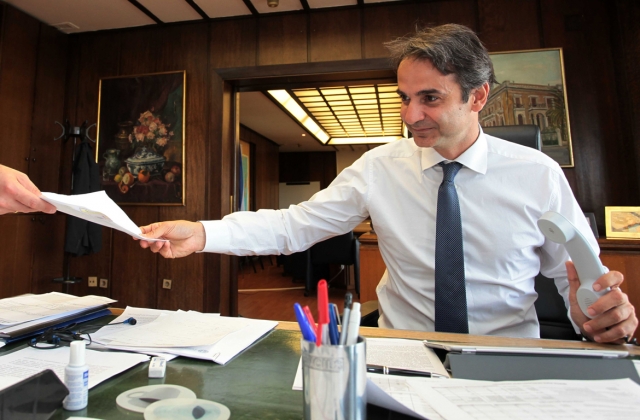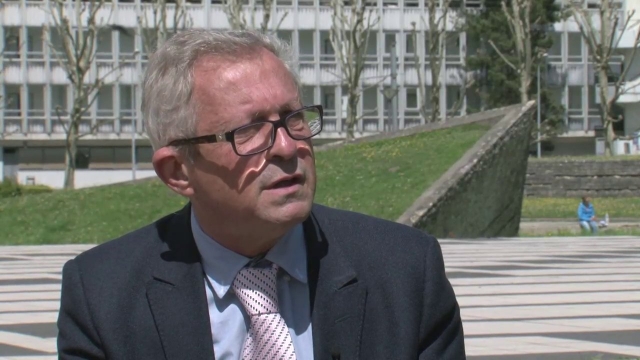Anastasia Balezdrova
Greece, which is in the sixth consecutive year of recession, needs more than reforms in order for it to recover and the solution may lie in new inventions and their practical application. This was the spirit of the first part of the Greek Forum of Innovation which is taking place in Athens.
"According to surveys, only 0.5% of the budget is allocated to new developments in Greece. This amount is insufficient and it cannot help stimulate young researchers. However, the problem is not just in funding," states professor at the University of Potsdam Alexandros Kritikos, who is one of the initiators of the forum.
"The chain in the development process of an original idea involves the following elements: basic research, application of the study, a small company, an entrepreneur. They activate a whole mechanism involving management, attraction of venture capital, recruitment, etc. In Greece, this scheme involves basic research which is faced by a wall of bureaucracy. This is the reason for capital and a large number of businessmen leaving the country and for the application of research work to be absent."
 Kritikos stresses the need to eliminate all bureaucratic barriers and to increase investment in research activities which Greek researchers who have preferred to go to work abroad can support as well. "What we need to do is to create a vision of what we want Greece to be within 10 years. Then we must set a specific goal and convince the Greek public that this is what we have to pursue," he concludes.
Kritikos stresses the need to eliminate all bureaucratic barriers and to increase investment in research activities which Greek researchers who have preferred to go to work abroad can support as well. "What we need to do is to create a vision of what we want Greece to be within 10 years. Then we must set a specific goal and convince the Greek public that this is what we have to pursue," he concludes.
"Innovation is absolutely necessary if we are to achieve economic growth. Unfortunately, very few Greeks perceive the crisis as an opportunity. The majority of them usually complain and want to return to the old model which permanently ended in 2009", says Minister of Administrative Reform Kyriakos Mitsotakis.
He admits that the state administration is actually hampering the entrepreneurs through the large number of laws and regulations which are turning the practical application of new ideas into an almost impossible mission. "However, for the first time it is clear in Greece that the economic development will be based on private initiative rather than on the so-called "state capitalism".

According to the Minister, the administration has already taken steps to support private business. Kyriakos Mitsotakis states that the government’s priority is to simplify the procedures and facilitate the connections between the citizens and the administration. Together with Minister of Development Costis Hatzidakis they have undertaken to make the necessary reforms to remove the bureaucratic barriers.
He also says that the new electronic platform, data.gov.gr, which will contain all data provided by the government agencies to the public, will be ready at the beginning of 2014 and that an electronic portal, which will enable the citizens and the institutions to establish contacts electronically, is being developed as well.
According to the head of the European Commission Task Force for Greece, Horst Reichenbach, in Greece there is a great potential for the development of research and its practical application. "Seven years ago, the country was in a much better position in this area than it is today. Even the return to this position is a sufficient incentive for the progressive development of new developments and for the achievement of economic growth," he said.
The ooperation with other countries, such as Germany, which relies on innovation, will contribute towards this as well, as stated by Deputy Minister of Education Thomas Rachel. He points out that 400 projects between researchers from Greece and Germany are currently underway, the investments in scientific discoveries of which amount to 30 billion euro.
Professor at the Federal Polytechnic Institute of Lausanne Joseph Sifakis states that Greece should learn from the experience of other countries. "What we must remember is that a unique model for innovation does not exist", he stated and presented the successful experience not only of major economies such as the USA, Japan and South Korea, but also of developing countries like China, India and Brazil, and of small ones (Israel, Switzerland, Taiwan).

Sifakis says that in addition to human resources it is necessary for Greece to renovate its research systems and integrate the management of research centres. "It is necessary to establish a National Science Foundation. The general secretariat of research remains under the control of the Ministry of Education," said Sifakis and added, "One of the most serious problems is bureaucracy. Although Greece is a country which offers low cost and good quality of life, investors say they will not come here if there is no guarantee for a serious attitude and if they will have to face the bureaucratic "wall" mentioned previously".
Cooperation with other countries, changes in the way in which the universities are operating and support for entrepreneurship are the recommendations made by Charles Wessner from the National Academy of Sciences in the USA. "A crisis is a serious thing to waste," he said at the end of his speech.
Browse GRReporter’s articles about Greek researchers who have succeeded in their scientific fields in foreign universities.
http://www.grreporter.info/en/greek_made_worlds_first_chip_graphene/4675